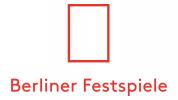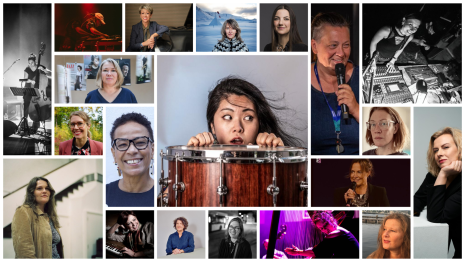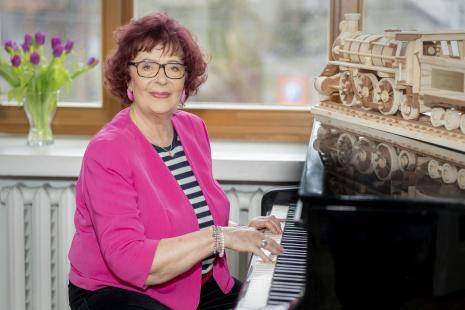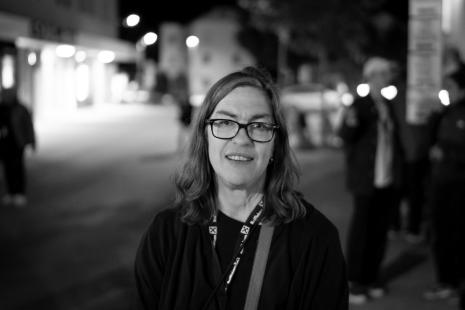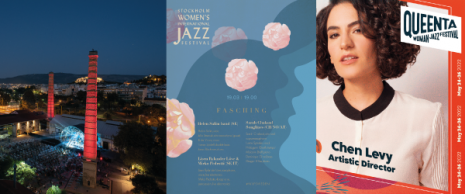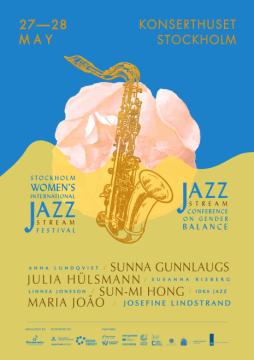Back to list
#WomenToTheFore 12: Nadin Deventer
We talk to Nadin Deventer, Artistic Director of Jazzfest Berlin, Under her leadership the festival won the Europe Jazz Network Award for Adventurous Programming in 2021, the first time it has been awarded to a female artistic director.
She has been a curator of festivals and has led artistic and interdisciplinary projects for over 20 years. This includes the Ruhrtriennale and Ruhr.2010 – European Capital of Culture. For the latter she curated “No blah-blah!”, an international jazz programme with 60 projects in more than 20 cities. For nine years she directed the jazzwerkruhr (2007-16), a regional network and festival and she curated the interdisciplinary festival n.a.t.u.r.- natürliche ästhetik trifft urbanen raum’ in 2013.
What inspired your early interest in music?
I grew up in a musical family in the German countryside. There wasn’t much going on nearby but the nearest city had a good music school focusing on pop and jazz, and it organised a bi-annual jazz exchange with young people from the United States.
So every other summer, a bunch of young musicians would come and spend three weeks with us and the following year we would go to their home. It meant lots of young people got in touch with jazz in a very natural way.
I sang in an acapella jazz ensemble at the music school and at 15 we founded an all-girls punk band called Bautrupp Atlantis. I sang and played the drums – everyone played everything of course! It was a very creative period, very DIY-driven, we even organised little festivals, and I started to understand what it's all about.
I was so lucky to have my sister Kathrin and to meet exceptional young people, especially as we grew up in such a quiet place. Many of my friends from these days studied music or theatre or philosophy and became professors, artists or professional jazz musicians. We were also politically active and this very creative time as teenagers influenced us to think outside the mainstream as adults.
After a 10-month stay with a French family, going to school in Paris (everything self organised, financial possibilities were always limited in our family), I finished high school back in Germany. I went back to France to study at the Sorbonne in Paris, then to Freie Universität in Berlin and on to Amsterdam for a European Studies course. I ended up combining it with music studies alongside a job in a call centre to pay the bills.
At the end of my European Studies/International Relations course, I returned to Germany for an internship at the committee of media and culture at the Bundestag in Berlin in 2004/5. I stayed for two years and wrote my master theses for them. This gave me insider insights to policy making but ultimately I wanted to work in the arts and see if I could build a career.
And what was your route into a career in music programming and festival curation?
I graduated at the time of the financial crisis and it was hard to find paid work, so I got used to working for nothing, or very little. I started to work in Dortmund where a former cinema was transformed into a jazz club and then at the Vlaanderen festival in Brussels.
Children often come by surprise and from 2008 I was – and still am – combining my career alongside the challenge of being a young mother. The Ruhr region would become the European Capital of Culture in 2010 and from 2008 onwards I developed proposals for different projects. I also ran jazzwerkruhr, a regional musicians jazz network, until 2017 which became my anchor for all activities in that region.
It was all really challenging and unpredictable, and also very precarious – an intense period of my life fighting for visibility and project funding. I was working day and night and I didn’t have a name or someone influential to open doors for me. I had to develop good ideas, and to dare to talk to people – within the Ruhr region and also to all the big guys from the jazz community in Europe – in order to convince them about my ideas and to get them involved with Ruhr.2010.
You’ve always taken an interdisciplinary approach to your work. Can you tell us a bit more about why this is important to you?
I wouldn’t have this job as artistic director of Jazzfest Berlin without my interdisciplinary background. The jazz festival is part of a much larger organisation called Berliner Festspiele, which includes multiple festivals. I was first hired at the end of 2013 to set up an interdisciplinary section called Special Projects and a year later I also worked as Head of Production for the Jazzfest.
I was always interested in processes, in creative project planning and collaborations – a lot of artists do this naturally and it's becoming much more common nowadays.
It's all about recognising possibilities, anticipation, reaching and mobilising people and believing in the potential of an idea or project and to go for it. I always needed to find allies and artists that have the same feeling and want to shape something new all together.
My European Capital of Culture programme for Ruhr.2010 was called ‘No Blah Blah!’ and it included 15 new collaborative projects, more than 200 musicians and 46 national and international partners that we presented in 25 cities all over in Europe. Another interdisciplinary milestone for me was shaping the programme for the third edition of the ‘festival n.a.t.u.r.- natürliche ästhetik trifft urbanen raum’ in 2013.
This initiative was started by young people from the electronic music scene taking over an abandoned train station in the city of Bochum. It was a real movement of collective ideas and power for all age groups, combining a participatory artistic approach with an activist movement, urban gardening etc. There were tours, workshops, films, flashmobs, lectures, concerts, installations, dance and theatre.
In my early career years, I needed to think outside of the box as I didn’t regularly programme for a club or festival – I needed to create something special for them in order to find my place. And leaving the concert halls for artistic interventions in the urban environment became my speciality.
She has been a curator of festivals and has led artistic and interdisciplinary projects for over 20 years. This includes the Ruhrtriennale and Ruhr.2010 – European Capital of Culture. For the latter she curated “No blah-blah!”, an international jazz programme with 60 projects in more than 20 cities. For nine years she directed the jazzwerkruhr (2007-16), a regional network and festival and she curated the interdisciplinary festival n.a.t.u.r.- natürliche ästhetik trifft urbanen raum’ in 2013.
What inspired your early interest in music?
I grew up in a musical family in the German countryside. There wasn’t much going on nearby but the nearest city had a good music school focusing on pop and jazz, and it organised a bi-annual jazz exchange with young people from the United States.
So every other summer, a bunch of young musicians would come and spend three weeks with us and the following year we would go to their home. It meant lots of young people got in touch with jazz in a very natural way.
I sang in an acapella jazz ensemble at the music school and at 15 we founded an all-girls punk band called Bautrupp Atlantis. I sang and played the drums – everyone played everything of course! It was a very creative period, very DIY-driven, we even organised little festivals, and I started to understand what it's all about.
I was so lucky to have my sister Kathrin and to meet exceptional young people, especially as we grew up in such a quiet place. Many of my friends from these days studied music or theatre or philosophy and became professors, artists or professional jazz musicians. We were also politically active and this very creative time as teenagers influenced us to think outside the mainstream as adults.
After a 10-month stay with a French family, going to school in Paris (everything self organised, financial possibilities were always limited in our family), I finished high school back in Germany. I went back to France to study at the Sorbonne in Paris, then to Freie Universität in Berlin and on to Amsterdam for a European Studies course. I ended up combining it with music studies alongside a job in a call centre to pay the bills.
At the end of my European Studies/International Relations course, I returned to Germany for an internship at the committee of media and culture at the Bundestag in Berlin in 2004/5. I stayed for two years and wrote my master theses for them. This gave me insider insights to policy making but ultimately I wanted to work in the arts and see if I could build a career.
And what was your route into a career in music programming and festival curation?
I graduated at the time of the financial crisis and it was hard to find paid work, so I got used to working for nothing, or very little. I started to work in Dortmund where a former cinema was transformed into a jazz club and then at the Vlaanderen festival in Brussels.
Children often come by surprise and from 2008 I was – and still am – combining my career alongside the challenge of being a young mother. The Ruhr region would become the European Capital of Culture in 2010 and from 2008 onwards I developed proposals for different projects. I also ran jazzwerkruhr, a regional musicians jazz network, until 2017 which became my anchor for all activities in that region.
It was all really challenging and unpredictable, and also very precarious – an intense period of my life fighting for visibility and project funding. I was working day and night and I didn’t have a name or someone influential to open doors for me. I had to develop good ideas, and to dare to talk to people – within the Ruhr region and also to all the big guys from the jazz community in Europe – in order to convince them about my ideas and to get them involved with Ruhr.2010.
You’ve always taken an interdisciplinary approach to your work. Can you tell us a bit more about why this is important to you?
I wouldn’t have this job as artistic director of Jazzfest Berlin without my interdisciplinary background. The jazz festival is part of a much larger organisation called Berliner Festspiele, which includes multiple festivals. I was first hired at the end of 2013 to set up an interdisciplinary section called Special Projects and a year later I also worked as Head of Production for the Jazzfest.
I was always interested in processes, in creative project planning and collaborations – a lot of artists do this naturally and it's becoming much more common nowadays.
It's all about recognising possibilities, anticipation, reaching and mobilising people and believing in the potential of an idea or project and to go for it. I always needed to find allies and artists that have the same feeling and want to shape something new all together.
My European Capital of Culture programme for Ruhr.2010 was called ‘No Blah Blah!’ and it included 15 new collaborative projects, more than 200 musicians and 46 national and international partners that we presented in 25 cities all over in Europe. Another interdisciplinary milestone for me was shaping the programme for the third edition of the ‘festival n.a.t.u.r.- natürliche ästhetik trifft urbanen raum’ in 2013.
This initiative was started by young people from the electronic music scene taking over an abandoned train station in the city of Bochum. It was a real movement of collective ideas and power for all age groups, combining a participatory artistic approach with an activist movement, urban gardening etc. There were tours, workshops, films, flashmobs, lectures, concerts, installations, dance and theatre.
In my early career years, I needed to think outside of the box as I didn’t regularly programme for a club or festival – I needed to create something special for them in order to find my place. And leaving the concert halls for artistic interventions in the urban environment became my speciality.
As a woman in the jazz and creative music sector, what have been some of the most significant challenges you’ve faced?
Sometimes when I speak to my European colleagues, they are surprised about the struggles that we face in Germany to enter into the paid world, and that contracts in the cultural sector are often limited to a quite short period of one or two years.
Working internationally helped me to establish myself. I created jazzplayseurope, an international network linked to jazzwerkruhr. And I also worked on projects and tours for a European Capital of Culture. Serving on the board of directors of the Europe Jazz Network between 2012 and 2018 helped me build up confidence and learn from others. At that time we re-shaped the whole network and transformed it into what it is today: an open, EU funded, heterogenic and very active network of some 200 members.
I was, and still am, always ready to pack and move to where there is work. Everything that I did for the first years was heavily underpaid and jazz was one of many disciplines I worked in. If I had relied on jazz alone I would never have been able to pay my bills.
As a young mother and freelancer, it was especially hard for the five first years. Trying to balance parenting a small child and working in a sector that is competitive and very neoliberal driven and showed no solidarity towards motherhood was a big barrier.
I ended up working on a portfolio of five or six projects at a time. In the year of the European Capital of Culture only I produced around 100 shows and projects, most of them alone. Being one of very few women and also a mother, I didn’t have a role model or a mentor to help me to find my way. On the contrary, I often felt that my male colleagues looked at me in a strange way, as if they couldn’t understand me and my different way of working and thinking. But some of them, especially since I became artistic director of Jazzfest Berlin in 2018, have supported me a lot and shared their experience.
When I encounter younger people now, they have much more of a focus on work-life balance and often think my generation and the one before are crazy for working the way we did. They want to have family time. It's my generation's children who are asking for this now, which is no coincidence.
You’re the first woman artistic director of Jazzfest Berlin. Your appointment was denounced by some in the cultural establishment. What are your reflections on this seven years later?
When my appointment was made public – the festival was in male hands for 54 years – the response was very positive internationally from the musicians' scene and also from a lot of colleagues in Europe. But there was a long silence among the jazz establishment in Germany, they seemed to be in shock. I was at a festival event and people would stop talking when they saw me, wondering: “How could this happen?” This was in 2017.
I was under a lot of pressure and it was very uncomfortable. It took me a while to accept that I was now the face of an institution like this that I couldn’t really identify with. I knew I had a year to prove that I could make my ideas work. I wanted to turn the festival upside down from my first edition, but I needed to bring the audience and partners, the media and the teams of the Berliner Festspiele with me. There was a one-time opportunity to get it right.
In my first national media interviews, it also felt like they were wondering, “Who is she?” and “Is she going to be a big failure?” and “Why are these white older men yelling about it?” The longer I'm in this business the more I realise it's not just about qualification or gender – it’s also that I’m part of the new generation and the older generation is losing power. My critics said that I was totally unqualified, but in fact, I was differently qualified to them.
People asked me where I came from and who my parents were, so class and background is an issue too. I was 39, with lots of experience working in different fields but it was a tough fight. I quickly realised that it was not only about me personally but about ‘someone like me’. The patriarchy in Germany was trying to defend territory from all sides. Honestly, I hope no one else has to experience this.
Seven years on, I’m still standing and also still learning – I am blessed because my career is a lifelong learning experience. But I still have the feeling that as a woman, I need to create something extraordinary to succeed.
Receiving the EJN Award for Adventurous Programming in 2021 meant the world to me. Getting the award in the name of some 150 colleagues all over Europe and a jury of journalists and musicians 14 years after I appeared on the scene was very moving and special. Being the artistic director of such a big festival comes along with big exposure and responsibility. And receiving a positive response for the way you are shaping and making use of such a big platform from artists, audiences, the media, and especially from my peers is very precious, motivating and rewarding.
What changes have you seen in gender equality over the last few years and what still needs to change?
There are now more women in leadership positions and there has been pressure on institutions to make this change. But we should also be looking at other aspects of diversity too, and whether women with children are given equal opportunities to progress.
It was always implied that combining family and work was my own problem to solve, and when I was given opportunities it was on the proviso that if I couldn’t manage it, the role wouldn’t continue. I was seen as risky having a baby and then a small kid. There was no solidarity at all for a young mother.
Nowadays, female musicians who are applying for funding can in some places ask for childcare, the same at some festivals, so things are starting to change. I’d also like to see more leadership positions that are part-time and shared.
As a society we need more children, and people want to have children and careers. The present father is more visible in the cultural sector now, but I still wonder whether mothers can get away from this presenteeism culture without being judged negatively.
Awareness of the issue has shifted but I’m not convinced change has been implemented yet.
Can you tell us more about your programming and leadership approach at JazzFest Berlin?
The festival often features unknown names and fairly avant-garde programming because Berlin is a very avant-garde city. I wouldn’t programme the same festival if it was in London or Paris or in the countryside. A festival has to be of its place.
Programming is all about understanding, communicating, analysis, anticipation and keeping up the pace but also about intuition – the arts is about emotions – and it’s something you feel. This sits alongside values and convictions that you hold.
As a curator, I try to be accessible to the world and to make sure all my senses are open. I am interested in the artists, the arts and music but not in what constitutes jazz or not.
Analytic, communicative and project development and management capacities are really important because there's so much to be done: hundreds of people to speak to, initiating a lot of processes, digesting a ton of information, taking teams, partners and musicians and audiences on board, constantly taking decisions and you wouldn’t know where to start and end without this.
One of my main purposes was to open up the festival, to really send out a big invitation to everybody in the city. Some musicians only want to play their music and I respect this. But you also need to find the artists and allies who love to collaborate, to co-create and to think deeply about possibilities, outside of the box, about spaces and topics. I work with lots of musicians from the Berlin scene, creating special projects together.
Programming an annual festival, you need to be in the here and now but also know where you came from and where you are taking a project to.
The festival has a local level, it has a global level because of its programming and visibility, it has a musical level, and also a societal one. It’s a complex affair. The shaping of each edition is a big challenge for me and they are never perfect. A first source of information or inspiration might be the centenary of the end of a war (2018), a response to a worldwide pandemic (2020 & 2021), a new war in Europe (2022) or an anniversary of the Jazzfest itself (2023 & 2024). I always try to create a narrative with each festival edition and to take a stand towards what’s happening in society.
I think we need to step out of our comfort zones and bubbles more.to build bridges. Society is falling apart maybe because we are all too focused on our own bubbles and realities. One of my biggest tasks with the festival is to break boundaries and to question the status quo, even if it's challenging for the audience, the artists and us festival makers.This is also what we are trying to do this year with the Jazzfest Community Lab Moabit and the international Jazzfest Research Lab, our two anniversary specials to celebrate 60 years of Jazzfest Berlin, in addition to our concert programme.
Sometimes when I speak to my European colleagues, they are surprised about the struggles that we face in Germany to enter into the paid world, and that contracts in the cultural sector are often limited to a quite short period of one or two years.
Working internationally helped me to establish myself. I created jazzplayseurope, an international network linked to jazzwerkruhr. And I also worked on projects and tours for a European Capital of Culture. Serving on the board of directors of the Europe Jazz Network between 2012 and 2018 helped me build up confidence and learn from others. At that time we re-shaped the whole network and transformed it into what it is today: an open, EU funded, heterogenic and very active network of some 200 members.
I was, and still am, always ready to pack and move to where there is work. Everything that I did for the first years was heavily underpaid and jazz was one of many disciplines I worked in. If I had relied on jazz alone I would never have been able to pay my bills.
As a young mother and freelancer, it was especially hard for the five first years. Trying to balance parenting a small child and working in a sector that is competitive and very neoliberal driven and showed no solidarity towards motherhood was a big barrier.
I ended up working on a portfolio of five or six projects at a time. In the year of the European Capital of Culture only I produced around 100 shows and projects, most of them alone. Being one of very few women and also a mother, I didn’t have a role model or a mentor to help me to find my way. On the contrary, I often felt that my male colleagues looked at me in a strange way, as if they couldn’t understand me and my different way of working and thinking. But some of them, especially since I became artistic director of Jazzfest Berlin in 2018, have supported me a lot and shared their experience.
When I encounter younger people now, they have much more of a focus on work-life balance and often think my generation and the one before are crazy for working the way we did. They want to have family time. It's my generation's children who are asking for this now, which is no coincidence.
You’re the first woman artistic director of Jazzfest Berlin. Your appointment was denounced by some in the cultural establishment. What are your reflections on this seven years later?
When my appointment was made public – the festival was in male hands for 54 years – the response was very positive internationally from the musicians' scene and also from a lot of colleagues in Europe. But there was a long silence among the jazz establishment in Germany, they seemed to be in shock. I was at a festival event and people would stop talking when they saw me, wondering: “How could this happen?” This was in 2017.
I was under a lot of pressure and it was very uncomfortable. It took me a while to accept that I was now the face of an institution like this that I couldn’t really identify with. I knew I had a year to prove that I could make my ideas work. I wanted to turn the festival upside down from my first edition, but I needed to bring the audience and partners, the media and the teams of the Berliner Festspiele with me. There was a one-time opportunity to get it right.
In my first national media interviews, it also felt like they were wondering, “Who is she?” and “Is she going to be a big failure?” and “Why are these white older men yelling about it?” The longer I'm in this business the more I realise it's not just about qualification or gender – it’s also that I’m part of the new generation and the older generation is losing power. My critics said that I was totally unqualified, but in fact, I was differently qualified to them.
People asked me where I came from and who my parents were, so class and background is an issue too. I was 39, with lots of experience working in different fields but it was a tough fight. I quickly realised that it was not only about me personally but about ‘someone like me’. The patriarchy in Germany was trying to defend territory from all sides. Honestly, I hope no one else has to experience this.
Seven years on, I’m still standing and also still learning – I am blessed because my career is a lifelong learning experience. But I still have the feeling that as a woman, I need to create something extraordinary to succeed.
Receiving the EJN Award for Adventurous Programming in 2021 meant the world to me. Getting the award in the name of some 150 colleagues all over Europe and a jury of journalists and musicians 14 years after I appeared on the scene was very moving and special. Being the artistic director of such a big festival comes along with big exposure and responsibility. And receiving a positive response for the way you are shaping and making use of such a big platform from artists, audiences, the media, and especially from my peers is very precious, motivating and rewarding.
What changes have you seen in gender equality over the last few years and what still needs to change?
There are now more women in leadership positions and there has been pressure on institutions to make this change. But we should also be looking at other aspects of diversity too, and whether women with children are given equal opportunities to progress.
It was always implied that combining family and work was my own problem to solve, and when I was given opportunities it was on the proviso that if I couldn’t manage it, the role wouldn’t continue. I was seen as risky having a baby and then a small kid. There was no solidarity at all for a young mother.
Nowadays, female musicians who are applying for funding can in some places ask for childcare, the same at some festivals, so things are starting to change. I’d also like to see more leadership positions that are part-time and shared.
As a society we need more children, and people want to have children and careers. The present father is more visible in the cultural sector now, but I still wonder whether mothers can get away from this presenteeism culture without being judged negatively.
Awareness of the issue has shifted but I’m not convinced change has been implemented yet.
Can you tell us more about your programming and leadership approach at JazzFest Berlin?
The festival often features unknown names and fairly avant-garde programming because Berlin is a very avant-garde city. I wouldn’t programme the same festival if it was in London or Paris or in the countryside. A festival has to be of its place.
Programming is all about understanding, communicating, analysis, anticipation and keeping up the pace but also about intuition – the arts is about emotions – and it’s something you feel. This sits alongside values and convictions that you hold.
As a curator, I try to be accessible to the world and to make sure all my senses are open. I am interested in the artists, the arts and music but not in what constitutes jazz or not.
Analytic, communicative and project development and management capacities are really important because there's so much to be done: hundreds of people to speak to, initiating a lot of processes, digesting a ton of information, taking teams, partners and musicians and audiences on board, constantly taking decisions and you wouldn’t know where to start and end without this.
One of my main purposes was to open up the festival, to really send out a big invitation to everybody in the city. Some musicians only want to play their music and I respect this. But you also need to find the artists and allies who love to collaborate, to co-create and to think deeply about possibilities, outside of the box, about spaces and topics. I work with lots of musicians from the Berlin scene, creating special projects together.
Programming an annual festival, you need to be in the here and now but also know where you came from and where you are taking a project to.
The festival has a local level, it has a global level because of its programming and visibility, it has a musical level, and also a societal one. It’s a complex affair. The shaping of each edition is a big challenge for me and they are never perfect. A first source of information or inspiration might be the centenary of the end of a war (2018), a response to a worldwide pandemic (2020 & 2021), a new war in Europe (2022) or an anniversary of the Jazzfest itself (2023 & 2024). I always try to create a narrative with each festival edition and to take a stand towards what’s happening in society.
I think we need to step out of our comfort zones and bubbles more.to build bridges. Society is falling apart maybe because we are all too focused on our own bubbles and realities. One of my biggest tasks with the festival is to break boundaries and to question the status quo, even if it's challenging for the audience, the artists and us festival makers.This is also what we are trying to do this year with the Jazzfest Community Lab Moabit and the international Jazzfest Research Lab, our two anniversary specials to celebrate 60 years of Jazzfest Berlin, in addition to our concert programme.
What advice would you give to young people who aspire to become programmers and curators?
You need to be dedicated and passionate about the arts, about people, our society and the world. Be flexible and also very analytical and anticipatory about identifying opportunities. Try to measure your investment of time and resources in these opportunities and reflect on whether you were right about them or not, in order to fulfil your dreams, to make the impossible possible.
Think big and fly high, find your voice and be different, take a stand and responsibility, challenge yourself and others, take risks, and embrace the risk to fail and fail better next time. Be brave and humble, trust your intuition and combine it with research, question things and yourself and dare to lead.
Be resilient and aware of people and the context you are dealing with, collect information, ask questions and listen, be open-minded, accessible and supportive, and try to do something that matters, something you consider necessary and relevant. Change the world to a better place by empowering and supporting others, and artists, to create something extraordinary together. Be happy, a door opener and an inspiration.
Let’s talk more about our failures. We only hear about the success stories but we can learn so much by sharing our failures too. I learned so much from the struggles I faced and am still facing.
And importantly, build up a good network – we need to support each other and to be there for each other as this is a lifelong journey. Being part of an international network is particularly helpful, it gave me the courage to go for it as artistic director of Jazzfest Berlin.
In 2024, Jazzfest Berlin will be celebrating its 60th anniversary with two special projects that take a look into the past and the future alongside the regular concert programme.
THE AFTERVIDEO of Moabit Community Lab 2024 is available at this link.
You need to be dedicated and passionate about the arts, about people, our society and the world. Be flexible and also very analytical and anticipatory about identifying opportunities. Try to measure your investment of time and resources in these opportunities and reflect on whether you were right about them or not, in order to fulfil your dreams, to make the impossible possible.
Think big and fly high, find your voice and be different, take a stand and responsibility, challenge yourself and others, take risks, and embrace the risk to fail and fail better next time. Be brave and humble, trust your intuition and combine it with research, question things and yourself and dare to lead.
Be resilient and aware of people and the context you are dealing with, collect information, ask questions and listen, be open-minded, accessible and supportive, and try to do something that matters, something you consider necessary and relevant. Change the world to a better place by empowering and supporting others, and artists, to create something extraordinary together. Be happy, a door opener and an inspiration.
Let’s talk more about our failures. We only hear about the success stories but we can learn so much by sharing our failures too. I learned so much from the struggles I faced and am still facing.
And importantly, build up a good network – we need to support each other and to be there for each other as this is a lifelong journey. Being part of an international network is particularly helpful, it gave me the courage to go for it as artistic director of Jazzfest Berlin.
In 2024, Jazzfest Berlin will be celebrating its 60th anniversary with two special projects that take a look into the past and the future alongside the regular concert programme.
THE AFTERVIDEO of Moabit Community Lab 2024 is available at this link.
